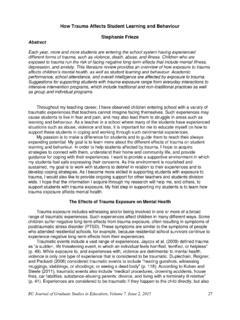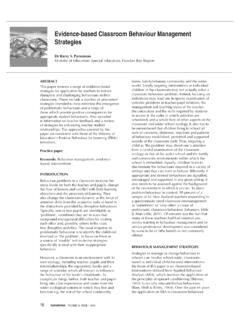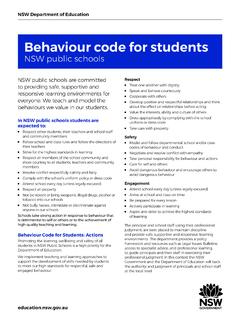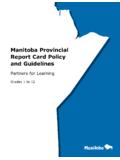Transcription of Student Learning: Attitudes, Engagement and Strategies
1 109 OECD 2004 learning for Tomorrow s World First Results from PISA 20033 Student learning : attitudes , Engagementand Strategies Introduction ..110 Existing evidence on Student approaches to learning and how it frames PISA s approach ..113 Measuring whether students are likely to adopt effective approaches to learning ..114 students Engagement with learning in mathematics and school more generally ..116 Interest in and enjoyment of mathematics ..116 Instrumental motivation ..121 students perception of how well school has prepared them for life.
2 125 students sense of belonging at school ..127 students beliefs about themselves ..132 students self-concept in mathematics ..132 students confidence in overcoming difficulties in mathematics ..136 Student anxiety in mathematics ..138 students learning Strategies ..141 Controlling the learning process ..141 Memorisation and elaboration Strategies ..145 How learner characteristics relate to each other and influence performance ..145 How learner characteristics vary across schools ..150A summary picture of gender differences in learner characteristics.
3 151 Implications for policy ..156110 Student learning : attitudes , Engagement and Strategies OECD 2004 learning for Tomorrow s World First Results from PISA 20033 INTRODUCTION Most children come to school ready and willing to learn. How can schools foster and strengthen this predisposition and ensure that young adults leave school with the motivation and capacity to continue learning throughout life? Without the development of these attitudes and skills, individuals will not be well prepared to acquire the new knowledge and skills necessary for successful adaptation to changing circumstances.
4 In school, teachers manage much of students learning . However, learning is enhanced if students can manage it themselves; moreover, once they leave school, people have to manage most of their own learning . To do this, they need to be able to establish goals, to persevere, to monitor their learning progress, to adjust their learning Strategies as necessary and to overcome difficulties in learning . students who leave school with the autonomy to set their own learning goals and with a sense that they can reach those goals are better equipped to learn throughout their genuine interest in school subjects is important as well.
5 students with an interest in a subject like mathematics are likely to be more motivated to manage their own learning and develop the requisite skills to become effective learners of that subject. Hence, interest in mathematics is relevant when considering the development of effective learning Strategies for mathematics. In contrast, anxiety about learning mathematics can act as a barrier to effective learning . students who feel anxious about their ability to cope in mathematics learning situations may avoid them and thus lose important career and life , the majority of students learning time is spent in school and as such the climate of the school is important for the creation of effective learning environments.
6 If a Student feels alienated and disengaged from the learning contexts in school, his or her potential to master fundamental skills and concepts and develop effective learning skills is likely to be comprehensive assessment of how well a country is performing in education must therefore look at these cognitive, affective and attitudinal aspects in addition to academic performance. To this end, PISA 2003 establishes a broader profile of what students are like as learners at age 15, one that includes students learning Strategies and some of the non-cognitive outcomes of schooling that are important for lifelong learning : their motivation, their Engagement and their beliefs about their own capacities.
7 Since the focus of PISA 2003 was on mathematics, most of these issues were analysed in the context of mathematics as chapter reports and analyses these results. It seeks to provide a better understanding of how various aspects of students attitudes to learning and their learning behaviour relate to each other and to Student performance, it observes how these relationships differ across countries, and it explores the distribution of relevant characteristics among students , schools and countries. After summarising existing evidence and explaining how students characteristics as learners are measured and reported in 2003, the chapter analyses in turn:Schools need to maintain and develop children s positive disposition to students acquire the skills to manage their own students interest in and positive attitudes towards the subjects they strengthen Student Engagement with school more shed light on this, PISA assessed Student approaches to this chapter gives a profile learning .
8 attitudes , Engagement and Strategies111 OECD 2004 learning for Tomorrow s World First Results from PISA 20033 students Engagement with mathematics and school. This is related both to their own interest and enjoyment and to external incentives. Subject motivation is often regarded as the driving force behind learning , but the analysis extends the picture to students more general attitudes towards school including stu-dents sense of belonging at school. students beliefs about themselves. This includes students views about their own competence and learning characteristics in mathematics, as well as attitudinal aspects, which have both been shown to have a considerable impact on the way they set goals, the Strategies they use and their performance.
9 students anxiety in mathematics, which is common among students in many countries and is known to affect performance. students learning Strategies . This considers what Strategies students use during learning . Also of interest is how these Strategies relate to motivational factors and students self-related beliefs as well as to students performance in mathematics. The chapter places considerable emphasis on comparing approaches to learning for males and females. Although Chapter 2 has shown gender differences in Student performance in mathematics to be moderate, this chapter shows that there are marked differences between males and females in their interest in and enjoyment of mathematics, their self-related beliefs, as well as their emotions and learning Strategies related to mathematics.
10 An important reason why these additional dimensions warrant policy attention is that research shows them to influence decisions about enrolment in school tracks or study programmes and courses where mathematics is an important subject. These decisions may, in turn, shape students post-secondary education and career choices. When interpreting the analyses reported in this chapter, three caveats need to be borne in mind. First, constructs such as interest in and enjoyment of mathematics and the use of particular types of learning Strategies are based on students self-reports, and not on direct measures.
















